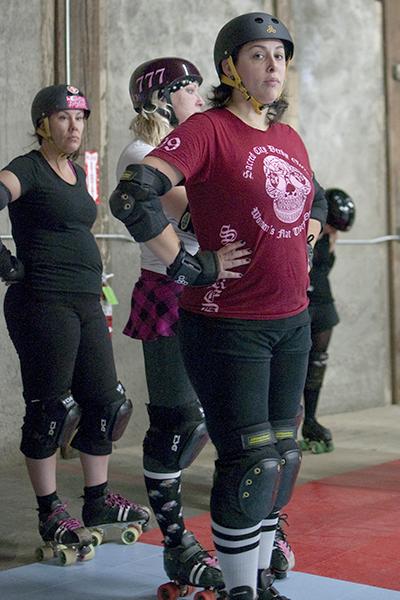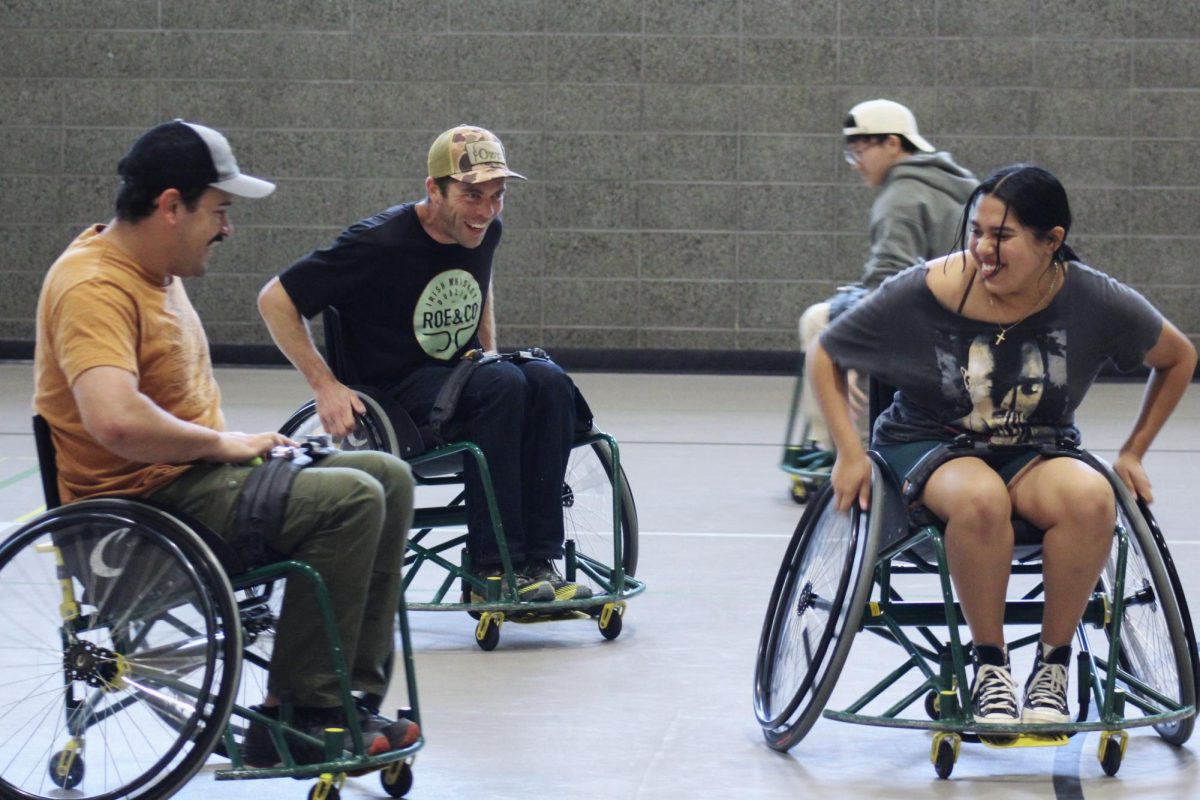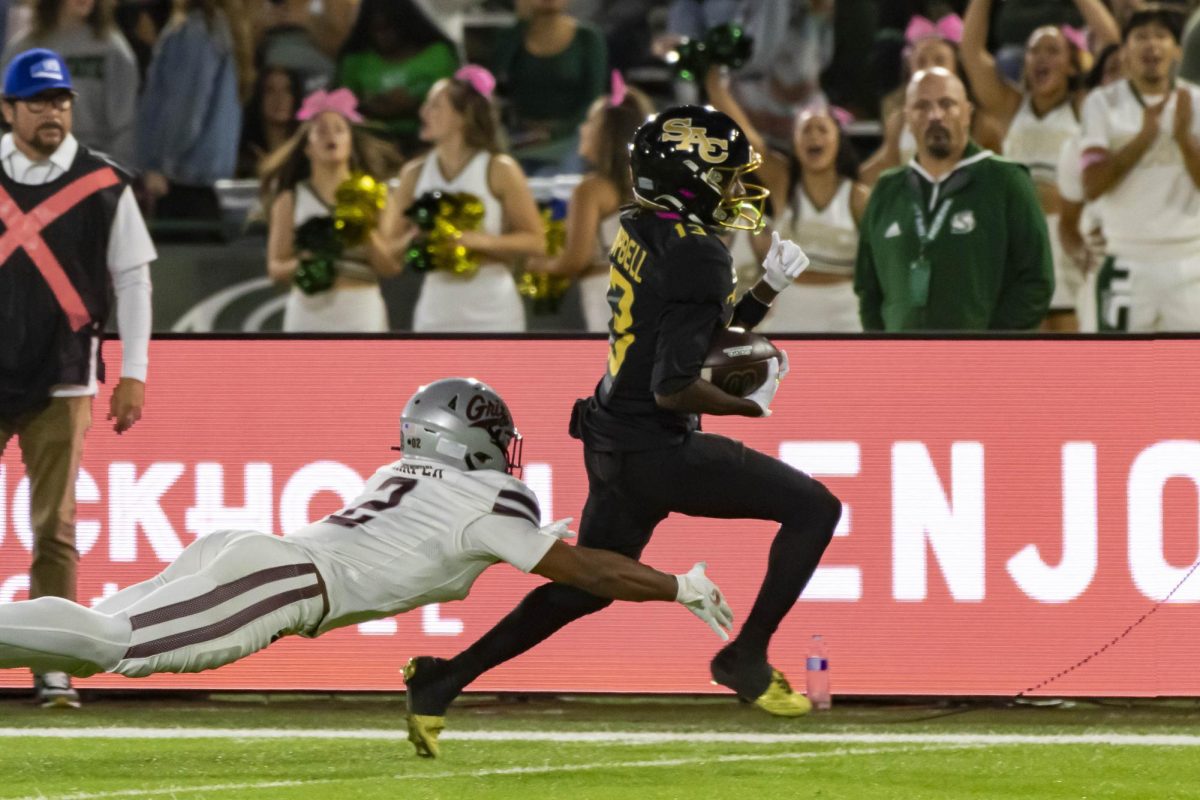?I hit people and don?t go to jail?

roller derby 1:Nelly Wollenberg, senior Spanish major, known by her deby name, “Attila The Honey” waits in line for drills during practice Thursday.:Robert Linggi – State Hornet
April 27, 2010
Members of the Sacred City Derby Girls have been injured so seriously that they needed nails, screws and plates inserted into their bodies to help them heal correctly. Despite these injuries, these strong women come back to the sport they love: roller derby.
Roller derby is a full-contact sport using “old-school” roller skates that started around the 1930s and “40s as a staged sport for entertainment, said Nelly Wollenberg, senior Spanish major and board member of the Sacred City Derby Girls. Derby has become more popular, she said, and is now more than just a show.
“We train really hard to make this a legitimate sport,” Wollenberg said. “Everything we do is real, including all of our injuries.”
Wollenberg said her nickname on the team is “Attila the Honey.””A friend suggested the name – everyone loved it and it just stuck,” Wollenberg said. “Attila the Hun was a really cruel conqueror and this is a play on his name with a sweet little twist.”
In a roller derby game, more commonly known as a “bout,” four blockers from each team make a pack and must help their “jammer” break past the opposing team’s blockers. The jammer scores points for every opponent she laps while her blockers obstruct the other team, Wollenberg said.
“As a blocker, my job is to simultaneously block the opposing team while trying to get our jammer through,” Wollenberg said. “I should constantly be hitting someone.”
The game, she said, is played in two 30-minute intervals made up of a series of two-minute-or-less “jams.” Each jammer has the ability to score points, but the lead jammer, or person who makes it through the pack first, has the ability to call off the “jam.”
“Being a lead jammer is strategic in the fact that if you get to the pack first and score first, you can call off the jam before the opposing jammer even scores a point,” Wollenberg said. “If neither jammer got through the pass legally, meaning that she fouled or stepped out of bounds, then it’s a full two-minute “jam’ because no one has the ability to call it off.”
To ensure a fair and safe game, the derby girls must learn and follow many rules. Illegal hitting zones, for instance, were set in place to ensure players do not unfairly strike opponents from the back, Wollenberg said.
“If I were to break the rules and come up and hit you from the back, I would get thrown into the penalty box for illegally hitting the opponent,” Wollenberg said.
Depending on the severity of the penalty, she said, one could stay in the penalty box for the entirety of the “jam.’ As with other sports, players who are penalized cannot be replaced with another member of the team.
“Once you’re out, you’re out,” Wollenberg said. “In a way, you’re letting your team down because there isn’t someone coming in to replace you.”
Penalties and rules are in place for a reason: to prevent injuries, Wollenberg said. But as with every sport, she said, the risk of injury is high.
“I’ve had knee injuries, broken ribs, hematomas or extreme bruising and even chipped bone off of my toes,” Wollenberg said. “You get hurt, but it’s worth it.”
Injuries are something that Rena Garcia, board member of the Sacred City Derby Girls, accepts as a part of playing derby. She said she has torn her meniscus in both legs, strained hamstrings and even had a “gnarly” concussion.
“All of my injuries don’t stop me because derby is way too much fun,” Garcia said. “I hit people and don’t go to jail.”
Garcia said living up to her derby name is another reason injuries do not sway her from playing this somewhat dangerous sport.
“My name is Shadow Soldier and that’s who I am,” Garcia said. “You’ve got to live up to your name.”
Garcia said there are two reasons for her derby nickname.
“The band Otep calls her fans shadow soldiers and she is a really inspiring aggressive artist,” Garcia said. “Also, this is a play on my father being a Vietnam veteran.”
Wollenberg said roller derby provides the women with a sense of camaraderie.
“We are a family, we refer to ourselves as sacred sisters for a reason,” Wollenberg said. “There are women that I have met in this league that I will be friends with for the rest of my life.”
Sacred City’s sense of family amongst its members is one of the reasons Christina Rodriguez, senior international relations major, decided to join.
“Nelly just always talked about how she loved the sport and the team,” Rodriguez said. “I was getting bored between school and work and this seemed like a perfect outlet for me.”
Unfortunately for both Wollenberg and Rodriguez, roller derby is an extreme time commitment and the two students often struggle to find a balance between school and their passion for skating.
Rodriguez said roller derby can easily dominate the teammates’ time since they practice three to four times a week.
“We do a lot of practicing to gain skill and strength,” Rodriguez said. By being a board member and coach of the new members, Garcia feels the time commitment restraints of being a derby girl.
She said a full-time job is difficult to maintain while on the team, so she decided to start a custom leather-making business that revolves around the sport.
“Every derby girl wants a custom leather belt with their name on it and team colors,” Garcia said. “I found a creative way to intertwine my life.”Despite the major time commitment and high risk of injury, these women continue to skate and play.
“I am so head-over-heels in love with this sport that it’s really important to me to work hard to improve myself as a skater,” Wollenberg said. “I physically could never walk away from this sport, it would hurt too much.”The Sacred City Derby Girls will be competing against the Los Angeles Aftershockers at 7 p.m. May 22 at RollerKing in Roseville. Tickets are available at sacredcityderbygirls.com.
Erin Rogers can be reached at [email protected]




























































































































